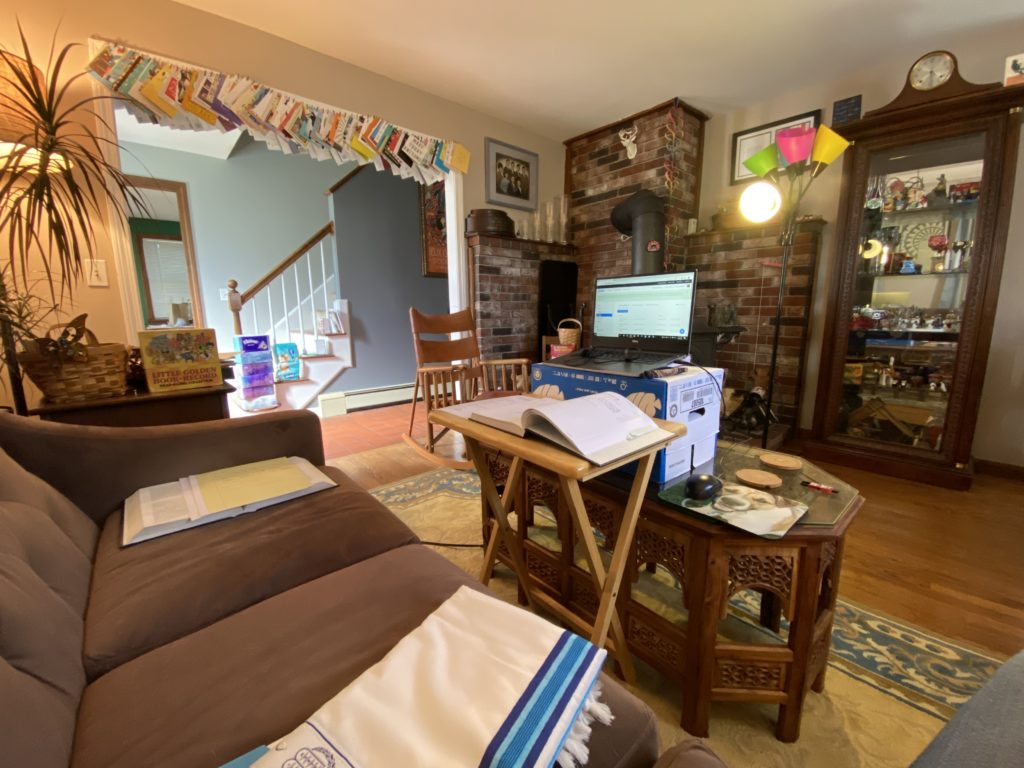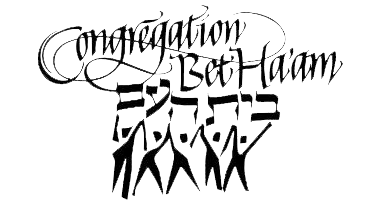by Rabbi Jared H. Saks
Some of you were there. Worship on Saturday, May 16, was an emotional service for me. It was an emotional week leading up to it. In the days before Shabbat, the Unitarian Universalist Association released a recommendation that there should be no in-person worship until the Spring 2021. I can’t say that’s what the Reform Movement will recommend, or whether it’s what we’ll do at Bet Ha’am, but it’s clear that we’re not even close to being out of the woods. The prospect of conducting worship from my living room for the next year, of pastoral care visits only by phone or Zoom for the next twelve months, of the next fifty or so Shabbats without our congregation hit me hard.
I was on a Zoom call with colleagues earlier in the week and one veteran rabbi said, “It feels like I’m a second-year rabbinical student.” I completely understood where she was coming from. I’ve often joked that one of the required courses in seminary should be audiovisual technologies. It’s usually a comment I make when the sound system doesn’t work in the sanctuary or I can’t seem to get my laptop to play through a television in religious school. It’s an understatement when it comes to leading worship on Zoom from my living room. I simply don’t know what I’m doing. I didn’t train for this. And all of that left me feeling deflated, feeling that I am failing our congregation in my leadership, because I am unable to lead dynamic, interactive, and engaging worship on Zoom each Shabbat. I came to realize through that service on May 16 that that shouldn’t be my goal.
The worship I’m conducting, the religious school classes Sam Spinrad and our volunteer teachers have been offering, the discussion groups and Torah Study and programs happening now, none of them are for production value. While it matters whether you can see and hear me, I need to know that the goal is not to produce something on par with Hollywood. It’s not even to produce something on par with another synagogue that has a robust budget and multiple paid staff to run tech for worship. We are Bet Ha’am, the House of the People, and what I think I lost sight of is that it’s the people that matter. The quality of our worship is not in my leading it perfectly, but in our being together, even if it’s in a format that is new and unfamiliar to nearly all of us.
One of the first things I did on that Saturday was to share a picture of my living room, not what you see when you tune in to services, but what things look like from my perspective. In addition to what you can see in that picture, I’ve also repurposed my son’s changing table as a bookcase. (Don’t worry; I sanitized it first!) I needed our community to see things as I see them, how we’ve lost our living room, converting it into my office and our sanctuary. I know so many of you have made similar changes to your homes.

I also realized how challenging it is not to be able to hear our congregation’s voices when I’m leading us in worship. I revealed how much I depend upon each of you. When I sing V’shamru, I sometimes lose track of which verse I’m singing when I finish each repetition of the chorus. In the sanctuary, I sometimes come in a half-beat late, waiting to hear Toby Rosenberg or Jane Snerson start first, so I know where we are. On Zoom, I can’t do that. It leaves me feeling lost.
We’re in this together and this is all new to all of us. We are rebuilding the wheel, but we’re doing it together. And I’m so grateful for our community. I realize now more than ever how much I depend on each of you. Now that manifests itself in my eyes wandering on the screen as I lead worship, because they dart to the chat box on Zoom so that I can see what people are saying, so that I know that I’m not alone. Without those interactions through the chat, it’s easy for me to forget that I’m leading to people and not to the camera on my computer. I recently watched a video of myself leading worship on Zoom. I looked completely distracted, my eyes darting up and down, left and right. What I realized, though, was that it wasn’t distraction. I was scrolling through the participants to see who was there. I was glancing at the chat to see what was being said. And I need to do those things to know you’re all out there. So I really encourage you, when you join us in worship, to use the technology to interact with each other and with me. Visit with each other in the chat box. It’ll feel more like community for me and I think it will for you, too.
There are a few verses of Torah to which I keep returning, Exodus 10:24-26. It’s in the middle of the Exodus narrative, as Moses is persuading Pharaoh to let the Hebrew people go free. Pharaoh agrees, then changes his mind, then agrees again, and so on. In this moment, we read, “Pharaoh summoned Moses and said, ‘Go worship the Eternal! Only your flocks and your herds shall be left behind; even your dependents may go with you.’ But Moses said, ‘You yourself must provide us with sacrifices and burnt offerings to offer up to the Eternal our God; our own livestock, too, shall go along with us—not a hoof shall remain behind: for we must select from it for the worship of the Eternal our God; and we shall not know with what we are to worship the Eternal until we arrive there.’”
Finally, Pharaoh has agreed to let the Israelites go, but on the condition that they leave their flocks and herds behind. One would think that Moses would say, “Great! Let’s get out of here!” But he doesn’t. Instead, he demands that Pharaoh provide them with their animals, as well. Why? Because he doesn’t know what they’ll need to worship God when they get wherever they are going.
We, too, don’t know where we’re going. But can we have the same faith as Moses who is confident that there will come a time to praise God for what we have survived? We don’t know what we’ll need when we get there, but we can know that we are in this together.
Photo by Nandini Khandelwal on Unsplash

